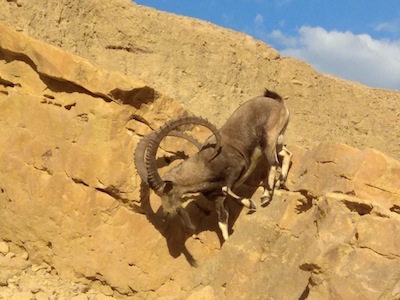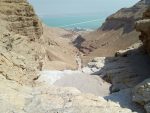On Canadian Friends of Hebrew University trips to the Israel National Trail, travelers will take their time and enjoy the landscape. (photo from Ami Dotan)
The Vancouver chapter of Canadian Friends of Hebrew University has plans to walk the Israel National Trail (Shvil Yisrael).
As it would take too long to walk the entire 1,000-kilometre trail, CFHU Vancouver will only walk its highlights, dividing them into five separate trips. The week-long excursions will be led by Ami Dotan, CFHU scholar-in-residence and a professional tour guide. The walks will take place each spring, beginning with a trip March 5-11, 2018.
“Generally, the main core of tour guiding in Israel involves going to Jerusalem and some of the holy sites and history and so on, which I totally love,” said Dotan. “But, whenever I get the chance to do some trekking, then I gravitate to it…. It’s my favourite thing. And, doing it on the INT – which was defined by National Geographic as one of the top 20 holy grails of treks in the world – it’s amazing.”
Dotan decided to kick the walks off by exploring Israel’s desert, as it provides such a contrast to the lush forests and lakes that most Canadians are used to at home.
“There’s something special about the desert,” he told the Independent. “There is no makeup of rivers and vegetation, just the essence, the core of things, the rocks and the ground…. Since I was a child, I loved the desert. Alone sometimes, with no cellphones, it touches your heart I think.
“If you ask yourself, ‘Why go to the desert?’ just think, the three major Western religions were conceived in deserts: Judaism, Christianity and Islam.”
Growing up in Jerusalem, Dotan recalls having stepped out of his home as a child and walking to the Kidron Valley from Jerusalem, making his way to the Dead Sea. Eventually, his father would come with their old car to bring him back home after dark. “That’s when I began developing a love for the desert,” said Dotan. “And, then, of course, during military service, walking in the desert.”
The trip Dotan will be leading in March will begin with an overnight in Mitzpe Ramon, going down into the crater and walking across it to the other side. This is a 12- to 13-kilometre stretch of serious desert.
The group will then bus to the Arava for a night. Dotan described this area as being “in between Israel and Jordan, but very safe. The next day, we’ll go do a trek called Maale Palmach (Palmach Ascent). This is an ascent nobody knew was possible to do … and the Bedouin who met them at the other side said it couldn’t be done…. Therefore,” he said, “it was named ‘the Ascent of the Jews’ by the Arabs. We’ll do part of the trek, including climbing up a ladder, to be able to [get up] this cliff that they walked up.”
The third day will have participants heading into sand dunes, to Kibbutz Ktura for the night. And, on the fourth day, they will go to the colourful sand rocks near Eilat and spend the night in Eilat.
“Lastly, on Saturday, for people who want to walk on Saturday, we’ll go up the mountain and then down through the INT,” said Dotan. “Then, for those who want to go on to Petra, we’ll spend three more days and continue to Petra.

“The trip will involve special activities around the walks, to better understand the culture and the character of the people who live there, and things we do in the desert. And, we have a Bedouin evening with local people – an amazing way to get to know the desert geographically, but also the people who’ve lived there for so long and how their life changes in a modern country, which is fascinating subject on its own.
“Next year [2019], we will do less desert, instead going to the north, which is also beautiful. I think, what you get in the north is more the human diversity. You have the Jews – Orthodox, secular and Modern Orthodox – and Arabs, Christians and Druze. In the desert, you have a Jewish population and Bedouin.”
Dotan chose to have the trips in March for two reasons. One is because they will take place before Passover, so participants will have time to return home for holiday preparation. The other reason is that, in March, the desert may have some flowers blooming, as well as some vegetation and grass.
“I hope we’ll even get to have an appointment with some mountain goats that have their babies that time of year – amazing to see,” said Dotan. “Hopefully, we’ll find natural water pools in the valleys filled with water. Not Canadian-scale quantities of water, but, after you’ve walked all day and have been sweating and warm, you’ll get to jump into this cold, fresh natural water … before it disappears in a few months.
“Also, of course, March is the time that birds migrate from Africa back to Europe. Twice a year, we have half a billion birds flying all over Israel, and many of them fly over the Syrian-African rift (which is the border between Israel and Jordan … just over our heads). So, you’ll be able to see swarms of all sorts of birds – birds of prey, storks and pelicans, whatever you want.”
According to Dotan, the trip is designed for people who have good mobility, but it won’t be extreme. There will be walks of roughly 12 kilometres a day, but, as Dotan said he has learned from experience, “It’s not a question so much how many kilometres you walk, it’s about what type of kilometres you walk. Yes, we are going to go down sometimes very steep rocks, but, obviously, it’s doable. It’s part of the excitement of walking in the desert. If you’re reasonably fit, you can do it…. I’ve had people 80 years old doing this trek. It’s not a matter of age. It’s a matter of if you’re enjoying the walk. We’re not going to rush. On the contrary, we have a lot of time to do it calmly and enjoy the landscape, nature, and excellent logistics.”
The tour group will get to stay in unique hotels at the end of each day, with a bus taking them to the beginning of the trails and picking them up at the end. “Every night, you will get to enjoy a hot shower, a good dinner, and so on and so forth,” said Dotan.
“This experience isn’t for those who rush. Rushing in the desert isn’t a good idea. I’ve done most of these treks with my 10-year-old son, and he’s not Superboy. It’s for anybody who loves nature and is reasonably fit for walking in the mountains, not just in a park. Even if you need to not participate for a day because you need the rest, then that’s possible and no problem.”
For more information about the CFHU Shvil tours, contact Dina Wachtel, Western Region executive director at 604-257-5133 or [email protected].
Rebeca Kuropatwa is a Winnipeg freelance writer.

